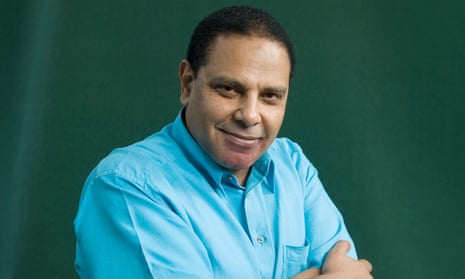Alaa al-Aswany, the bestselling Egyptian author of The Yacoubian Building, has been sued by military prosecutors in Egypt for “insulting the president, the armed forces and judicial institutions”.
According to his French publisher, Actes Sud, the accusations relate to the columns Aswany has published in Deutsche Welle Arabic, and to his latest novel The Republic, As If, which recounts the events of the 2011 revolution in Egypt. On his Facebook page, Aswany said the case against him was “a clear violation of article 65 of the Egyptian constitution[pdf], which states, ‘Freedom of thought and opinion is guaranteed. All individuals have the right to express their opinion through speech, writing, imagery, or any other means of expression and publication’,” and that it was also “a violation of article 19 of the Universal Declaration of Human Rights, to which Egypt is a signatory”.
“I am being pursued because I bear witness to what I saw and what I lived, and because of my writings,” he told Les Nouveaux Dissidents. “For having said what I think. For having expressed myself and for giving my opinion. I am a writer, and what I write displeases the regime.”
Egypt Today reported that the lawsuit related in particular to the Deutsche Welle Arabic article entitled “Why don’t we understand what the world understands?”, in which Aswany criticised the appointment of military generals in civil positions.
Aswany is one of Egypt’s most celebrated novelists. The Yacoubian Building, both a celebration and dissection of modern Cairo, was first published in 2002. It has now sold more than 1m copies in 35 languages. Aswany took an active part in the Arab spring in 2011, and was at the Tahrir Square protests – an experience which inspired his latest novel.
“Those 18 days were the most beautiful days of my life,” he told the Guardian in 2016, of the Tahrir Square demonstrations, adding of his writing: “My concept of literature is as an artistic defence of human values. You cannot be committed to the defence of human values and, when you have millions of people in the street and people dying, stay at home. I don’t think I’m exceptional – there is a long history of novelists who took action to defend revolutions and human values in writing and in the street as well.”
In 2014, he was banned from publishing his weekly column in an Egyptian daily, and from appearing on state-run media. The next year, he was prevented by Egyptian state security from putting on a public seminar. He now lives in the US, where he teaches literature. He told Les Nouveaux Dissidents that he had not been able to publish “a line” in Egypt for five years, although he writes in Arabic on Twitter and for Deutsche Welle. The legal action has worried him for his family in Egypt. “One can imagine frightening situations, in which they are removed, in which they disappear,” he said. “That has happened to my friends – revolutionary friends whose relatives were kidnapped or who disappeared from one day to the next. This regime is terrifying.”
